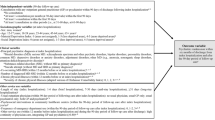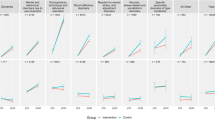Abstract
Detailed evaluation of changes in patient retention in psychiatric care as a result of the onset of the COVID-19 pandemic have not been studied. Here, we present a retrospective analysis of aggregate data from a large academic health system (n = 16,701 patients) to examine if there were differences in patients leaving psychiatric care from the pre-COVID-19 period to the first 12 months of the COVID-19 pandemic. Demographic, clinical, and behavioral factors were studied using logistic regressions to determine significant associations in leaving psychiatric care during COVID-19 and in the 12 months immediately prior to the pandemic. Factors identified with a higher odds of leaving psychiatric care during COVID-19 that were not associated with leaving care prior to COVID-19 included demographic (male sex, uninsured (self-pay) status), behavioral (inactive patient health portal), and diagnostic (anxiety and trauma stressor disorders, pervasive and specific developmental disorders, and disorders of childhood) factors. These results highlight that the reasons patients left care during the period immediately after the COVID-19 pandemic may have been multifactorial in nature, although certain patterns seem to have appeared. Further study is needed to elucidate why these specific factors may have driven patients to leave psychiatric treatment during the COVID-19 pandemic.

Similar content being viewed by others
Data Availability
The data that support the findings of this study are not openly available due to reasons of sensitivity and privacy but are available from the corresponding author upon reasonable request. Data re located in a controlled access data storage at the University of North Carolina-Chapel Hill.
References
Kithiia J, Wanyonyi I, Maina J, Jefwa T, Gamoyo M. The socio-economic impacts of Covid-19 restrictions: Data from the coastal city of Mombasa Kenya. Data Brief. 2020;33:106317.
Chakraborty I, Maity P. COVID-19 outbreak: Migration, effects on society, global environment and prevention. Sci Total Environ. 2020;728:138882.
Wassler P, Talarico C. Sociocultural impacts of COVID-19: A social representations perspective. Tour Manag Perspect. 2021;38:100813.
Pierce BS, Perrin PB, Tyler CM, McKee GB, Watson JD. The COVID-19 telepsychology revolution: A national study of pandemic-based changes in U.S. mental health care delivery. Am Psychol. 2021;76:14–25.
Seo JH, Kim SJ, Lee M, Kang JI. Impact of the COVID-19 pandemic on mental health service use among psychiatric outpatients in a tertiary hospital. J Affect Disord. 2021;290:279–83.
Joo SW, Kim H, Jo YT, Ahn S, Choi YJ, Choi W, et al. Impact of the early phase of the COVID-19 pandemic on the use of mental health services in South Korea: a nationwide, health insurance data-based study. Soc Psychiatry Psychiatr Epidemiol. 2023;58:441–52.
Perozziello A, Sousa D, Aubriot B, Dauriac-Le MV. Use of mental health services in the aftermath of COVID-19 waves: a retrospective study conducted in a French Psychiatric and Neurosciences University Hospital. BMJ Open. 2023;13:e064305.
Wettstein A, Tlali M, Joska JA, Cornell M, Skrivankova VW, Seedat S, et al. The effect of the COVID-19 lockdown on mental health care use in South Africa: an interrupted time-series analysis. Epidemiol Psychiatr Sci. 2022;31:e43.
Kim KH, Lee SM, Hong M, Han K-M, Paik J-W. Changes in mental health service utilization before and during the COVID-19 pandemic: a nationwide database analysis in Korea. Epidemiol Health. 2023;45:e2023022.
Avalone L, Barron C, King C, Linn-Walton R, Lau J, McQuistion HL, et al. Rapid Telepsychiatry Implementation During COVID-19: Increased Attendance at the Largest Health System in the United States. Psychiatr Serv. 2021;72:708–11.
Hellstern RB, Robinson WD. The Impact of COVID-19 and Telehealth Services on Attrition Rates in Psychotherapy. Contemp Fam Ther. 2023;45(3):253–64.
Childs AW, Bacon SM, Klingensmith K, Li L, Unger A, Wing AM, et al. Showing Up Is Half the Battle: The Impact of Telehealth on Psychiatric Appointment Attendance for Hospital-Based Intensive Outpatient Services During COVID-19. Telemed J E Health. 2021;27:835–42.
Vatcheva KP, Lee M, McCormick JB, Rahbar MH. Multicollinearity in regression analyses conducted in epidemiologic studies. Epidemiology. 2016;6(2):227.
Reneses B, Muñoz E, López-Ibor JJ. Factors predicting drop-out in community mental health centres. World Psychiatry. 2009;8:173–7.
Zimmermann D, Rubel J, Page AC, Lutz W. Therapist Effects on and Predictors of Non-Consensual Dropout in Psychotherapy. Clin Psychol Psychother. 2017;24:312–21.
Terlizzi EP, Schiller JS. Mental Health Treatment Among Adults Aged 18–44: United States, 2019–2021. NCHS Data Brief. 2022;1–8.
Terlizzi EP, Zablotsky B. Mental health treatment among adults: United States 2019. National Center for Health Statistics; 2020. Report No.: 380.
Yang K-WK, Rattsev I, Lkhagvajav Z, Flaks-Manov N, Gorman K, Epstein JA, et al. Patterns of healthcare utilization according to health equity determinants during the first year of the pandemic at Johns Hopkins Medicine. JAMIA Open. 2024;7:ooae093.
McBain RK, Cantor J, Pera MF, Breslau J, Bravata DM, Whaley CM. Mental Health Service Utilization Rates Among Commercially Insured Adults in the US During the First Year of the COVID-19 Pandemic. JAMA Health Forum. 2023;4:e224936.
Law K-B, McCord C, Ward MM, Ullrich F, Marcin JP, Carter KD, et al. 2024 Differences in Behavioral Health Treatment among Rural American Clinics Utilizing In-Person and Telehealth Treatment Modalities. J Technol Behav Sci
Vakkalanka JP, Gadag K, Lavin L, Ternes S, Healy HS, Merchant KAS, et al. Telehealth Use and Health Equity for Mental Health and Substance Use Disorder During the COVID-19 Pandemic: A Systematic Review. Telemed J E Health. 2024;30:1205–20.
Jacobson C, DeYoung J, Ibarra O. Barriers to Virtual Care Access Impacting Already Underserved Communities – United States of Care. United States of Care; 2021 Mar.
Hsiao V, Chandereng T, Lankton RL, Huebner JA, Baltus JJ, Flood GE, et al. Disparities in Telemedicine Access: A Cross-Sectional Study of a Newly Established Infrastructure during the COVID-19 Pandemic. Appl Clin Inform. 2021;12:445–58.
Sachs JW, Graven P, Gold JA, Kassakian SZ. Disparities in telephone and video telehealth engagement during the COVID-19 pandemic. JAMIA Open. 2021;4:056.
Pierce RP, Stevermer JJ. Disparities in the use of telehealth at the onset of the COVID-19 public health emergency. J Telemed Telecare. 2023;29:3–9.
Zhang D, Shi L, Han X, Li Y, Jalajel NA, Patel S, et al. Disparities in telehealth utilization during the COVID-19 pandemic: Findings from a nationally representative survey in the United States. J Telemed Telecare. 2024;30:90–7.
Kormendi NM, Brown AD. Asian American mental health during COVID-19: A call for task-sharing interventions. SSM Ment Health. 2021;1:100006.
Garcia MA, Homan PA, García C, Brown TH. The Color of COVID-19: Structural Racism and the Disproportionate Impact of the Pandemic on Older Black and Latinx Adults. J Gerontol B Psychol Sci Soc Sci. 2021;76:e75-80.
Thomeer MB, Moody MD, Yahirun J. Racial and Ethnic Disparities in Mental Health and Mental Health Care During The COVID-19 Pandemic. J Racial Ethn Health Disparities. 2023;10:961–76.
Swift JK, Greenberg RP. Premature discontinuation in adult psychotherapy: a meta-analysis. J Consult Clin Psychol. 2012;80:547–59.
Cooper AA, Conklin LR. Dropout from individual psychotherapy for major depression: A meta-analysis of randomized clinical trials. Clin Psychol Rev. 2015;40:57–65.
Windle E, Tee H, Sabitova A, Jovanovic N, Priebe S, Carr C. Association of Patient Treatment Preference With Dropout and Clinical Outcomes in Adult Psychosocial Mental Health Interventions: A Systematic Review and Meta-analysis. JAMA Psychiat. 2020;77:294–302.
Doran JM, Pietrzak RH, Hoff R, Harpaz-Rotem I. Psychotherapy utilization and retention in a national sample of veterans with PTSD. J Clin Psychol. 2017;73:1259–79.
Greene JA, Bina R, Gum AM. Interventions to increase retention in mental health services: A systematic review. Psychiatr Serv. 2016;67:485–95.
Alon N, Perret S, Cohen A, Partiquin M, LeMelle S, Boyd C, et al. Digital Navigator Training to Increase Access to Mental Health Care in Community-Based Organizations. Psychiatr Serv. 2024;75:608–11.
Acknowledgements
The authors would like to acknowledge Kai Xia for assistance with statistical interpretation.
Funding
The authors report no funding supported this research.
Author information
Authors and Affiliations
Contributions
Conceptualization (Nathaniel A. Sowa); Project administration (Nathaniel A. Sowa); Data Curation (Xiaoming Zeng); Formal Analysis (Xiaoming Zeng); Methodology (National A. Sowa, Xiaoming Zeng); Writing – original draft preparation (Nathaniel A. Sowa, Xiaoming Zeng); Writing – reviewing and editing (Nathaniel A. Sowa, Xiaoming Zeng); Resources (Xiaoming Zeng); Visualization (Nathaniel A. Sowa, Xiaoming Zeng).
Corresponding author
Ethics declarations
Ethics Approval
This retrospective study involving human participants was in accordance with the ethical standards of the institutional review board (IRB) of the University of North Carolina-Chapel Hill and with the 1964 Helsinki Declaration.
Compliance with Ethical Standards
The authors have nothing to disclose related to this work. The University of North Carolina Institutional Review Board reviewed this study and determined it exempt from further review.
Conflict of Interest
The authors declare that they have no conflicts of interest.
Additional information
Publisher's Note
Springer Nature remains neutral with regard to jurisdictional claims in published maps and institutional affiliations.
Supplementary Information
Below is the link to the electronic supplementary material.
Rights and permissions
Springer Nature or its licensor (e.g. a society or other partner) holds exclusive rights to this article under a publishing agreement with the author(s) or other rightsholder(s); author self-archiving of the accepted manuscript version of this article is solely governed by the terms of such publishing agreement and applicable law.
About this article
Cite this article
Sowa, N.A., Zeng, X. Factors Associated with Leaving Ambulatory Psychiatric Treatment in a Large, Academic Health System During the COVID-19 Pandemic. Psychiatr Q (2025). https://doi.org/10.1007/s11126-025-10129-7
Accepted:
Published:
DOI: https://doi.org/10.1007/s11126-025-10129-7




